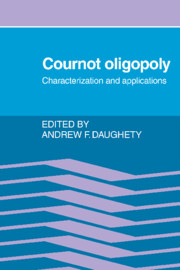Book contents
- Frontmatter
- Contents
- Preface
- Part I Introduction
- Part II Background
- Part III Examining Cournot's model
- Part IV Applications
- 12 Cournot and Walras equilibrium
- 13 Duopoly information equilibrium: Cournot and Bertrand
- 14 Information transmission – Cournot and Bertrand equilibria
- 15 Uncertainty resolution, private information aggregation, and the Cournot competitive limit
- 16 Losses from horizontal merger: the effects of an exogenous change in industry structure on Cournot–Nash equilibrium
- 17 Delegation and the theory of the firm
- 18 A study of cartel stability: the Joint Executive Committee, 1880–1886
15 - Uncertainty resolution, private information aggregation, and the Cournot competitive limit
Published online by Cambridge University Press: 07 September 2009
- Frontmatter
- Contents
- Preface
- Part I Introduction
- Part II Background
- Part III Examining Cournot's model
- Part IV Applications
- 12 Cournot and Walras equilibrium
- 13 Duopoly information equilibrium: Cournot and Bertrand
- 14 Information transmission – Cournot and Bertrand equilibria
- 15 Uncertainty resolution, private information aggregation, and the Cournot competitive limit
- 16 Losses from horizontal merger: the effects of an exogenous change in industry structure on Cournot–Nash equilibrium
- 17 Delegation and the theory of the firm
- 18 A study of cartel stability: the Joint Executive Committee, 1880–1886
Summary
A Cournot model of oligopoly in which otherwise identical firms have private differential information about the common cost of production and a shared (but unknown) demand curve is examined. A Bayesian equilibrium of the corresponding game of incomplete information is solved for explicitly and analyzed. In the symmetric equilibrium, different firms produce at different output levels because they have different information. Because the information individual firms have is random, total output and hence market price is also random for any finite number of firms.
The main result of the paper relates to the asymptotic properties of the equilibrium, when the number of firms becomes large. Under fairly general conditions on the joint distribution of demand and individual firms' information about demand, the random equilibrium price converges almost surely to a constant in the limit. More importantly, this price equals the perfectly competitive price. In other words, in large markets, even if no firm knows the true market demand curve and firms are not price-takers and do not use price as a signal to improve their information, the competitive price will prevail with certainty. In the limit, aggregate outcomes are as if all firms shared their private information with each other.
Introduction
In a stimulating paper, Wilson (1977) makes an observation about how a particular market mechanism is able to process diverse imperfect information in a very efficient way.
Information
- Type
- Chapter
- Information
- Cournot OligopolyCharacterization and Applications, pp. 353 - 372Publisher: Cambridge University PressPrint publication year: 1989
